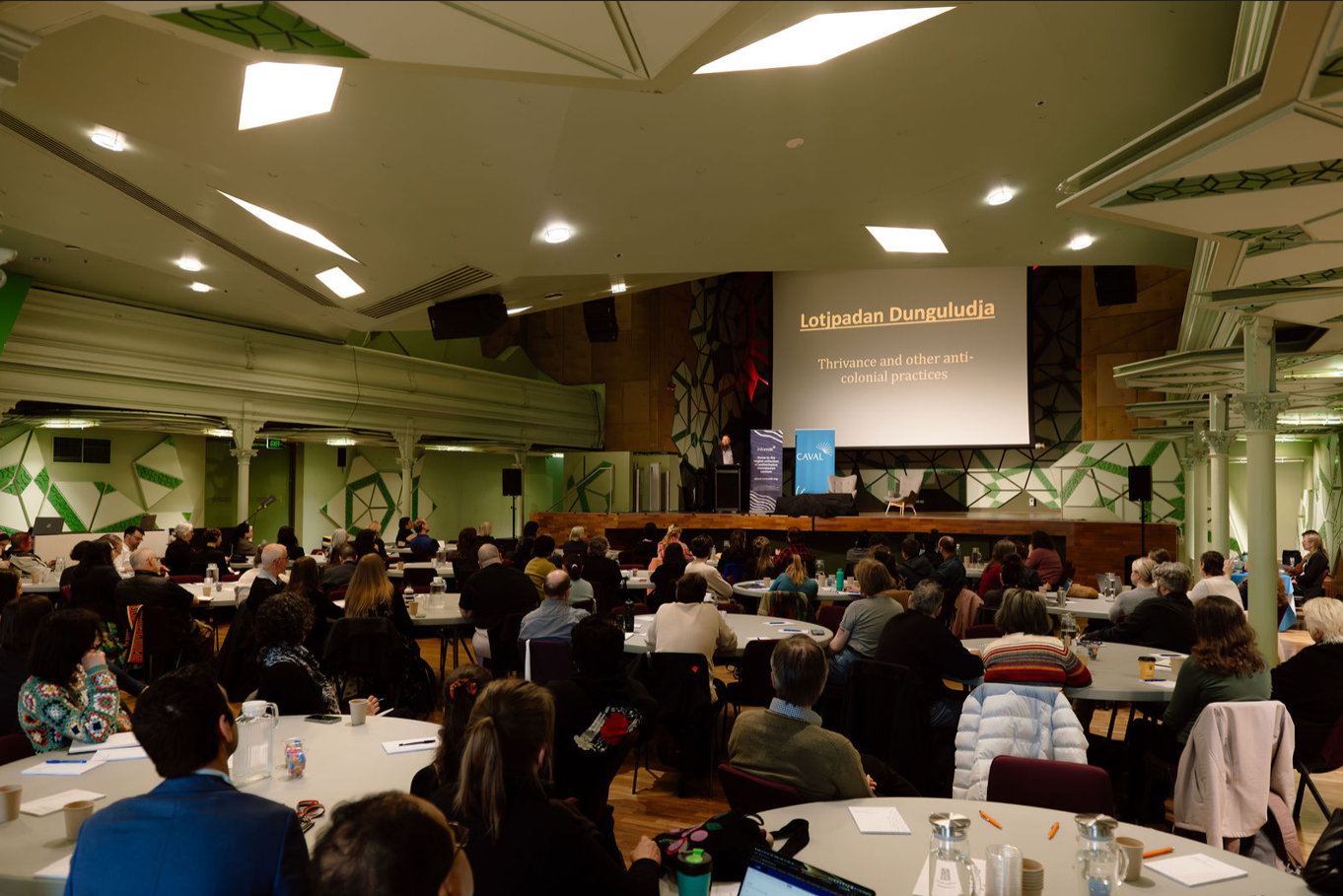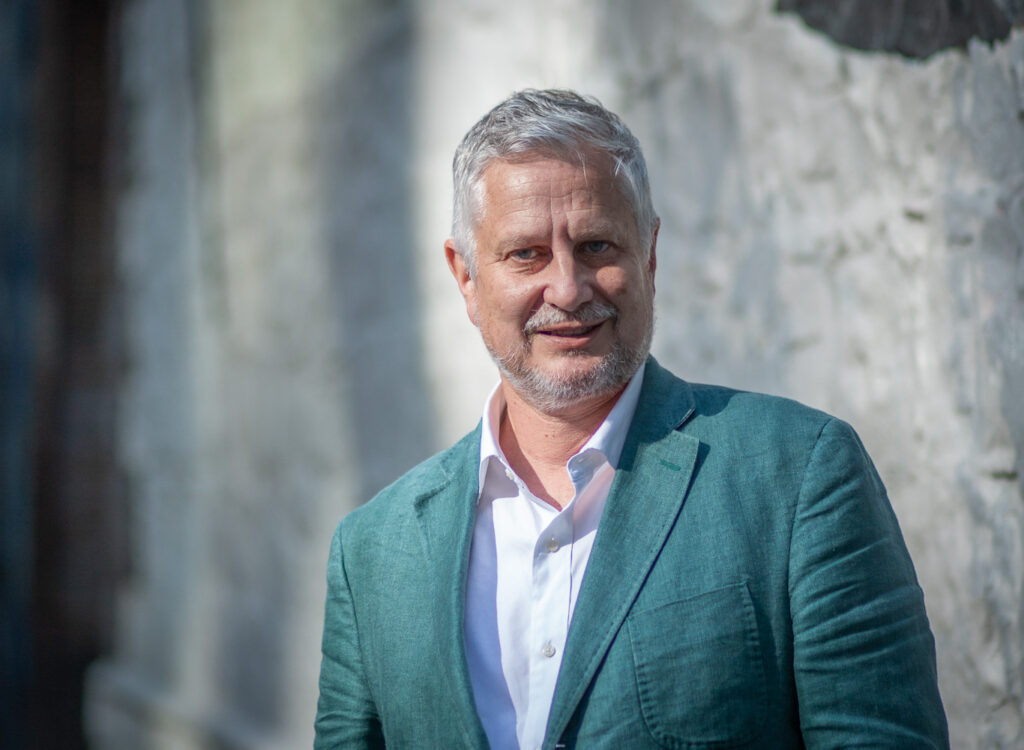
A packed Storey Hall and over two hundred online attendees joined Informit and CAVAL on Tuesday 9th September for the third Kummargii Yulendji Symposium, a forum for the movement that is Indigenising academia and the archive.
Wurundjeri Elder Perry Wandin warmly welcomed us to Country and shared his lineage through the Willam Balluk clan to Ngurungaeta (head men) Simon Wonga and William Barak, via his great grandfather Robert Wandoon and his father, who was the last to be born on Coranderrk.

Keynote presenter Tiriki Onus spoke from his experience as artist, academic and filmmaker, his role as Pro Vice Chancellor (Indigenous) at University of Melbourne, and his leadership of the Wilin Centre for Indigenous Arts and the Research Unit for Indigenous Arts and Cultures. In his engaging presentation, Lotjpadan Dunguludja – Thrivance and other anti-colonial practices, Onus reflected on the profound shift from Aboriginal people being ‘the most researched people in the world’ to now being the instigators of research.
He shared his project of collective reclamation of the cultural practice of possum skin cloak-making as an ‘act of thrivance’. This complex project produced not just the tangible object or document of the cloak with its makers’ stories burned into its skin, but the fraught yet ultimately meaningful coming together of community members to navigate processes of Indigenous Knowledges in a settler colony, striving towards co-design and cultural thrivance. Onus encouraged us all to consider our positionality, our own ‘yearning’ and its impact, amplify First Peoples’ voices, and to look beyond deficit narratives to tell stories differently.

Tui Raven and panellists from Deakin University Library had a productive discussion on the elevation of Indigenous Knowledges through citation, evolving from asking ‘What is it to ‘embed Indigenous Knowledges’ and how do you start?’ The Deakin team set about the process of implementing the Indigenous Archive Collective and CAVAL’s Referencing Toolkit, consulting staff and students on its usability in practice. Positive findings included that by introducing students to the toolkit, there was an increase in students’ criticality in choice of resources, use of strengths-based resources, and elevation of Indigenous authors.

A panel chaired by Dr Eugenia Flynn with acclaimed First Nations authors and academics Dr Evelyn Araluen Corr, A/Prof. Crystal McKinnon and Bridget Caldwell-Bright elucidated the need for, and foundational processes in establishing, their new journal: Sovereign Texts: Journal of First Peoples Literature. They spoke of the desire of ‘the industry’ for Blak writers’ work on the shelf, versus the lack of support and cultural safety they often experienced in the publishing process. They outlined the importance of self-determination in publishing, the ‘sovereignty of our words’ and writing for mob. The panellists all honoured the late Dr Charmaine Papertalk Green-Smith, who was on the new journal’s editorial board and instrumental in its naming, through a discussion of her literary contributions. Sovereign Texts has been supported through Informit’s Cultural Fund, and we are excited to see the first issue launch in the coming year.

Dr Rose Barrowcliffe (Butchalla), postdoctoral research fellow in Critical Indigenous Studies at Macquarie University and member of the Indigenous Archives Collective, delivered the second keynote presentation: ‘Amplifying Indigenous Knowledge Authority in Research’. She proposed breaking the cycle of extractive research through multiple approaches. Dr Barrowcliffe referred again to the Indigenous Knowledge Attribution Toolkit that she co-authored (discussed earlier by Tui Raven’s panel), outlining its principles: to critically analyse sources; respect Indigenous knowledge authority; support the reclamation of Indigenous knowledges; understand one’s own positionality in relation to knowledges; and confidently draw on and attribute Indigenous knowledges.[1] Rose emphasised it is important to understand or find out who is the closest in relationship to the work or knowledge, and to attribute this knowledge authority. Dr Barrowcliffe drew on examples from her fascinating fieldwork in New York Botanical Gardens where she contributed to reconnecting Australian specimen record data back to Country and Traditional Owners, and a project with Bidjara community: ‘Making the Right to Know Possible’ where she worked with local people to access their archival materials. Working with Indigenous communities as an outsider-researcher, Dr Barrowcliffe reiterates the importance of affirming there is local interest in your project idea, calling for community partners as Chief Investigators, and benefit-sharing of outcomes.

A session of short lightning talks illuminated current research by First Nations PhD candidates: embedding Indigenous perspectives in teacher education by Melissa Serrurier; and a study of First Nations young peoples’ experiences of incarceration by Rebecca Hird. We also heard about the amplification of Indigenous publications including music and language media through Sydney University Press (Naomi van Groll); and updates on Charles Sturt University Library’s cultural safety program, including management of secret and sacred materials and inclusion of Country in author affiliations (Mikaela Hill and Yasmine Hall).

Noeleen Lumby and Lara Keys introduced their innovative approach to embedding Indigenous knowledges and rethinking the organisation of library resources and services, drawing from Bishop and Tynan’s notions of Kin and Country[2] at Waranara Library, Macquarie University. Dr John Doolah gave us a wonderful peek into the complex cosmology and knowledge system of his Meriam-Semsap people of the Eastern Torres Strait and the importance of including this knowledge in Australian education. Emily Hobson and Allison Lettin from the National Archives described their work supporting access to the archives for First Nations people, particularly Stolen Generations survivors seeking evidence for reparations applications.

And finally, Samantha Faulkner, N’arwee’t Professor Carolyn Briggs and Jeanine Leane reflected on the legacy of Meanjin journal, in publishing First Nations writers, focusing on The Meanjin Paper, the lead essay written by a First Nations Elder in each issue since 2023, an initiative under the editorial leadership of Esther Anatolitis. This bittersweet discussion (following the very recent announcement of Meanjin’s closure) gave weight to the value of this much-loved journal.
It was apt that N’arwee’t Carolyn rounded up the very full and rich day of this symposium that she named: Kummargii Yulendji, meaning ‘Knowledge is rising’ in Boon wurrung. As we were privileged to witness, Indigenous Knowledges continue to rise and the communities and streams of practice driving these important changes continue to grow and evolve. The conversation continues.
[1] Faulkhead, S., Thorpe, K., Sentance, N. M., Booker, L., & Barrowcliffe, R. (2023). Indigenous referencing guidance for Indigenous knowledges.
[2] Bishop, M., & Tynan, L. (2024). Incorporating Indigenous perspectives through the Kin and Country Framework. Metaphor, (3), 27–31. https://search.informit.org/doi/10.3316/informit.T2024070400006201816981421


